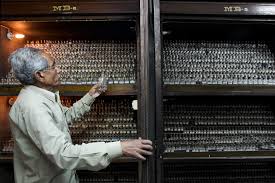By M.W. Van Denburg, A. M., M. D. Mt. Vernon, N. Y.

The fact of the power of high potencies to remove disease effects and restore, or cause to be restored to health cases of undoubtedly morbid conditions, is no longer subject to doubt, save by those who have never made the experiment, or, having attempted to make it, have not used the proper means and methods.
Failure to demonstrate a scientific statement depends always upon pursuing certain methods within certain limits. Often, as in the manufacture of chemicals, a great degree of accuracy is required to avoid failure.
Haphazard methods in drug-cure ought not to be blamed if they give haphazard results.
This is usually the case. Now entirely satisfactory, now of no use whatever, or even increasing the condition.
Let no one, therefore deny the power of high potencies until he has made sufficient trials to warrant a scientific conclusion, free from the doubt of imperfect methods.
Beyond a doubt, such an investigator will reach some most astonishing results of cure, and some very flat failures. These will be the natural and logical results of accurate prescriptions and of faulty ones. The first, a fitting of actual drug-effects upon the healthy to the morbid effects manifested by the patient.
The second will result from either of two causes, or both combined. The case has not been properly diagnosed as to sensations, tissue changes, and environmental effects, or modalities (the last, though at first sight, seeming of little value, are never the less excellent car-marks of the proper remedy), or the drug itself has failed to act as expected. The failure of the drug to act may arise form one or several causes:
First – The potency may not be high enough. 30x, 50x, 100x, 100c, 200c even 500 have each been known to give undoubted results.
- First, because curative effects have followed the drug administration in so many similar cases that, by all rules of scientific reasoning, we should attribute the results to the remedy.
- In other similar cases, other drugs have failed to produce the desired results.
- Because results have followed very soon after the drug has been taken, and in such a way as to leave no doubt, at the time, of their being the result of taking the drug. When such examples have been repeated several times with great uniformity, it is reasonable to attribute them to the curative powers of the drug given.
Second – The failure of high potencies to cure may arise from the fact that the drug-symptoms used were not the active drug-effects upon the prover.
- Not all symptoms given in the books are reliable drug-effects. Some are mistaken effects due to faulty observation.
- The patient may have an idiosyncrasy hostile to the effect of this particular drug. This is not often the case, but there are. However. Well established cases of this kind.
Third – The drug preparation may not be reliable.
High potencies are often disregarded because they are so unreasonably small.
Our own judgment of values has nothing to do with the fact of cure, any more than our before-hand judgments as to what the results will be of new combinations in chemistry. Nature has her own ways of doing things independent of our prejudices or pre-judgements.
We are beginning to learn just a little in the great field of ionization effects in physics, and we know still less of these effects in physiology. There are many elements in the normal blood and normal tissues of which chemistry gives only the faintest trace, but they are always present in normal physiological conditions. It is more than probable that they are also necessary to those conditions.
It is equally probable that even the slightest increase or diminution of these minute substances have much to do with the maintenance of health and the repair of morbid tissues and morbid vital manifestations. There is no room for doubt in this respect, since the mental and moral effects of certain drugs are no less evident than their somatic effects.
The effects of drugs in mental disease are quite as marked as in tissue disease. This is a matter of common knowledge; the explanation of this fact is another matter.
Because in his day Hahnemann gave his personal views and explanations and because they now seem unwarranted in the light of our greater knowledge in many fields of vital investigation is no reason for either accepting or rejecting the facts of drug-effects in curing morbid conditions. These rest on an entirely different basis, namely, experimental proof or disproof under methods of drug administration based upon proven relationship between drug-effects and disease-effect. If the results of certain methods are on the whole beneficial in curing the sick then there must be an actual relationship which it is of the highest importance to learn, and to employ.
Because certain practitioners have seen the light of the value of high potencies in curing the sick, and because some have drawn wild and unwarranted conclusion there from, does not change the facts.
Because some medical men scout all ideas as to the possible value of high potencies does not alter the facts.
Because some have made bungling and imperfect use of the method of cure according to similars does not alter the facts.
Skill in diagnosing drug-sickness, skill in diagnosing morbid states in the sick, skill in matching the leading and basic manifestations of the one with the other, these are the principles that count, and their application will bring results satisfactory in a very large percentage of the case the physician is called to treat.




